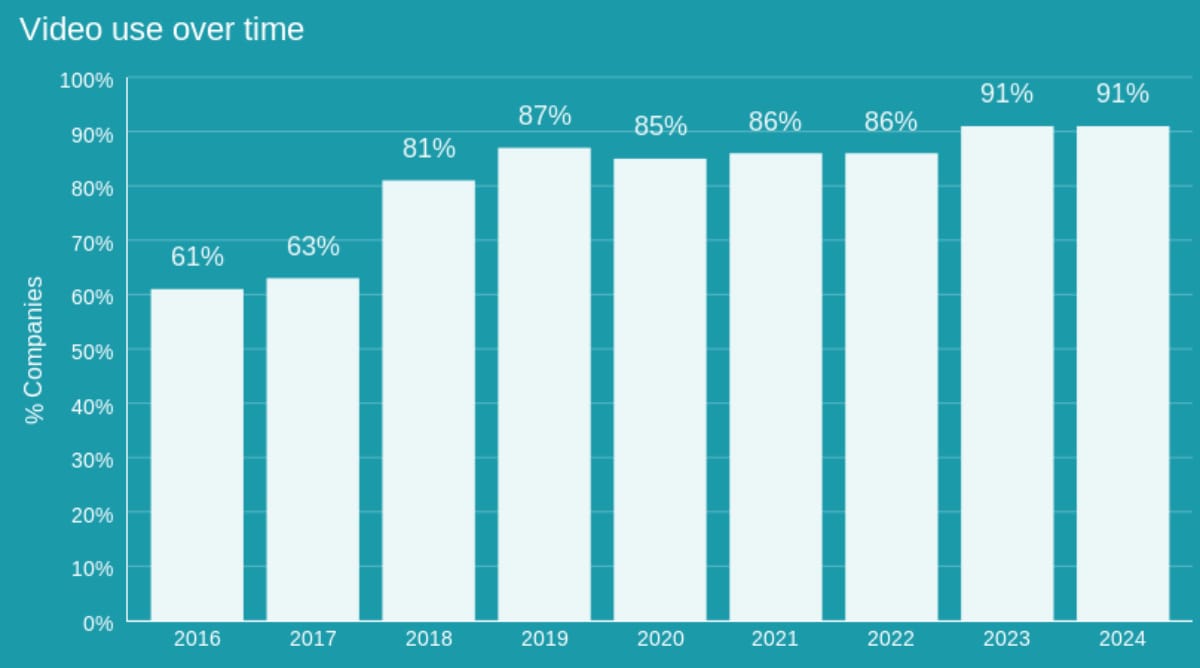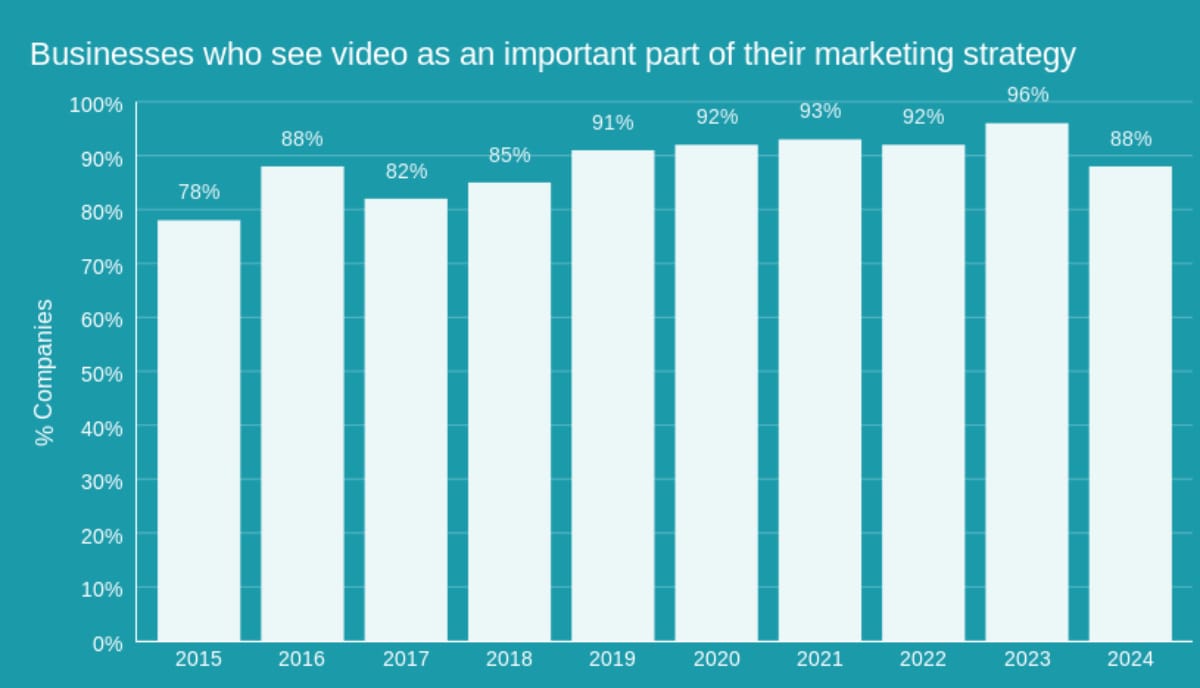The Future of Search is Video (2024)

The way we search for and consume information is undergoing a profound transformation, with video search poised to dethrone traditional text-based engines. Fueled by our insatiable appetite for immersive, visual content and enabled by cutting-edge technologies, video search is revolutionizing how we access and consume information online.
This tectonic shift in how we seek and obtain information will have far-reaching implications across users, businesses, and the tech ecosystem at large. Users can expect more intuitive and engaging ways to find what they need, while businesses must adapt to leverage the power of video for marketing, customer support, and beyond. Concurrently, technology developers face exciting challenges in refining visual recognition, personalization algorithms, and seamless video indexing to meet this disruptive evolution.
The Rise of Video Content

The surge in video content is one of the most notable trends in the digital world today. Platforms like YouTube, TikTok, and Instagram have experienced explosive growth, making video a central form of communication, entertainment, and information dissemination. This rapid increase in video content is driven by several key factors:
- User Engagement: Videos are inherently more engaging than text. They have the ability to convey emotions, tell compelling stories, and present complex information in a format that is easy to understand and enjoyable to watch. This engagement factor is a significant driver of video content consumption.
- Technological Advancements: The widespread availability of high-speed internet, advancements in mobile technology, and the proliferation of affordable video production tools have made creating and consuming video content more accessible than ever before. High-definition video streaming is now commonplace, contributing to the rise in video consumption.
- Social Media Integration: Social media platforms prioritize video content, enhancing its visibility and shareability. Algorithms on platforms like Facebook, Instagram, and TikTok favor video posts, which encourages more users and brands to create and share video content.

As video content continues to dominate the digital world, the need for effective video search capabilities becomes increasingly important. Users are looking for efficient ways to find specific video content amidst the vast sea of available videos.
The Mechanics of Video Search

Traditional text-based search engines rely on indexing and retrieving information based on text algorithms. However, video search requires a different approach due to the multimedia nature of its content. Video search engines utilize advanced technologies such as machine learning, artificial intelligence (AI), and natural language processing (NLP) to analyze and index video content effectively.
- Metadata Extraction: Metadata, including titles, descriptions, and tags, is crucial for indexing video content. However, relying solely on metadata can be limiting as it may not fully capture the video's content. Video search engines use metadata as a starting point but go beyond it to analyze the video itself.
- Transcription and Subtitles: Transcribing the audio component of videos into text allows search engines to index spoken content. Automated transcription tools have become increasingly accurate, enabling more effective video search. Subtitles and captions also enhance accessibility and searchability.
- Image and Object Recognition: AI-powered tools can analyze the visual content of videos, recognizing objects, faces, scenes, and even emotions. This technology allows for more nuanced search capabilities, enabling users to search for specific visual elements within videos.
- Contextual Understanding: Advanced NLP techniques allow search engines to understand the context and semantics of video content. This contextual understanding improves the relevance of search results, providing users with more accurate and meaningful outcomes.
By leveraging these technologies, video search engines can deliver more precise and relevant results, enhancing the user experience and making it easier to find specific video content.
Benefits of Video Search

The shift towards video search offers numerous benefits for users and businesses alike, transforming how we access and interact with information.
- Enhanced User Experience: Video search can provide more accurate and relevant results, enhancing the overall user experience. Users can quickly find the information they need without sifting through irrelevant content. The ability to search within videos for specific moments or topics further enhances usability.
- Improved Accessibility: Video content can be more accessible to people with different learning styles and abilities. Visual learners may find videos more helpful than text-based content, while subtitles and captions make videos accessible to individuals with hearing impairments. Translations and multilingual subtitles can also broaden the reach of video content.
- Increased Engagement: Videos tend to have higher engagement rates compared to text. By leveraging video search, businesses can capture and retain users' attention more effectively. Engaging video content can lead to longer viewing times, higher interaction rates, and increased user satisfaction.
- New Opportunities for Content Creators: Video search opens up new opportunities for content creators to reach wider audiences. By optimizing their videos for search engines, creators can increase their visibility and discoverability, attracting more viewers and subscribers. This can lead to increased monetization opportunities and audience growth.
The benefits of video search extend beyond user experience, providing businesses and content creators with powerful tools to enhance their digital presence and engagement.
Challenges and Solutions

While the future of video search is promising, several challenges must be addressed to fully realize its potential. These challenges include data privacy concerns, content moderation issues, the need for standardization, and scalability.
- Data Privacy: The collection and analysis of video data raise privacy concerns. It is crucial to implement robust data protection measures to safeguard users' privacy. Transparent data policies, secure data storage, and compliance with privacy regulations are essential to address these concerns.
- Content Moderation: Ensuring the quality and appropriateness of video content is a significant challenge. With the vast amount of video content being uploaded daily, effective content moderation is necessary to filter out harmful or misleading content. Advanced AI algorithms can assist in identifying and removing inappropriate content, but human oversight remains important.
- Standardization: Developing standardized protocols for video indexing and search is essential to ensure consistency and interoperability across different platforms. Standardization can facilitate the sharing and integration of video content, improving the overall search experience.
- Scalability: Video search engines must be capable of handling vast amounts of data efficiently. Scalable infrastructure and efficient algorithms are critical for maintaining performance as video content continues to grow. Cloud computing and distributed systems can provide the necessary scalability to support large-scale video search operations.
Addressing these challenges requires a combination of technological innovation, regulatory frameworks, and industry collaboration to create a robust and reliable video search ecosystem.
The Role of AI and Machine Learning

Artificial intelligence and machine learning are at the heart of the video search revolution, enabling search engines to analyze and understand video content at a deeper level.
- Deep Learning: Deep learning algorithms can process vast amounts of data, recognizing patterns and making predictions. These algorithms are essential for tasks such as image recognition, speech transcription, and contextual understanding. Deep learning models can identify objects, scenes, and even emotions within videos, enhancing search capabilities.
- Natural Language Processing: NLP enables search engines to understand and interpret human language. Advanced NLP models can analyze spoken content in videos, improving the accuracy of search results. NLP techniques also facilitate the extraction of meaningful information from video transcripts and captions.
- Reinforcement Learning: Reinforcement learning algorithms can optimize search algorithms over time, learning from user interactions and feedback to provide better results. These algorithms can adapt to user preferences and behaviors, delivering personalized search experiences.
AI and machine learning technologies are continuously evolving, driving improvements in video search capabilities and enhancing the overall user experience.
Case Studies

Several companies are at the forefront of the video search revolution, demonstrating the potential of this technology and setting new standards for the industry.
- YouTube: As the world's largest video platform, YouTube has invested heavily in video search technology. The platform uses a combination of metadata, transcription, and AI to deliver relevant search results to users. YouTube's search algorithm considers various factors, including video titles, descriptions, tags, and user engagement metrics, to rank and recommend videos.
- Google: Google has integrated video search capabilities into its search engine, allowing users to find specific moments within videos. This feature is powered by advanced AI algorithms that analyze video content, providing time-stamped search results. Users can jump directly to relevant parts of a video based on their search queries, enhancing the search experience.
- TikTok: TikTok's algorithm is renowned for its ability to surface highly relevant and engaging content. The platform uses machine learning to analyze user behavior and preferences, delivering personalized video recommendations. TikTok's search capabilities are designed to help users discover trending content and explore new interests.
These companies are leading the way in video search innovation, demonstrating the potential of AI and machine learning to enhance the search experience and drive user engagement.
The Future of Video Search

The future of video search is bright, with several exciting developments on the horizon that will further transform how we access and interact with video content.
- Voice Search Integration: Voice search is becoming increasingly popular, and its integration with video search will provide a seamless user experience. Users will be able to search for video content using natural language queries, making the search process more intuitive and efficient. Voice-activated search assistants, such as Google Assistant and Amazon Alexa, are expected to play a significant role in this development.
- Augmented Reality (AR) and Virtual Reality (VR): AR and VR technologies offer new possibilities for video search. Users will be able to search for and interact with video content in immersive environments. For example, AR applications can overlay search results onto the real world, while VR can provide a fully immersive video search experience.
- Interactive Videos: Interactive videos allow users to engage with content in new ways, such as choosing different story paths or accessing additional information within the video. Video search engines will need to adapt to index and retrieve interactive elements within videos, providing users with more engaging and personalized search experiences.
- Hyper-Personalization: AI-powered personalization will enable video search engines to deliver highly tailored content recommendations based on users' preferences and behaviors. Hyper-personalization will enhance the relevance of search results, ensuring that users find the most relevant and engaging content quickly and easily.
These emerging trends and technologies will continue to shape the future of video search, offering new ways for users to discover, interact with, and enjoy video content.
Implications for Businesses

The rise of video search has significant implications for businesses across various industries, offering new opportunities for marketing, e-commerce, education, and healthcare.
- Marketing and Advertising: Video search provides new opportunities for targeted advertising. Businesses can reach their audience more effectively by optimizing their video content for search engines. Video ads can be tailored to specific user interests and preferences, increasing engagement and conversion rates.
- E-commerce: Video search can enhance the online shopping experience. Shoppers can find product reviews, tutorials, and unboxing videos, making informed purchasing decisions. Businesses can use video search to showcase their products and connect with potential customers more effectively.
- Education: Video search can transform education by making learning resources more accessible. Students can find instructional videos and lectures on a wide range of topics, enhancing their learning experience. Educational institutions can use video search to reach a broader audience and provide valuable resources to learners worldwide.
- Healthcare: Video search can improve access to healthcare information. Patients can find instructional videos on medical procedures, health tips, and wellness advice. Healthcare providers can use video search to disseminate important information and connect with patients more effectively.

By leveraging the power of video search, businesses can enhance their digital presence, improve user engagement, and drive growth in their respective industries.
Final Thoughts
The future of search is undoubtedly video. As video content continues to grow in popularity, video search technologies will become increasingly sophisticated, transforming how we access and interact with information. This shift presents both opportunities and challenges, requiring innovative solutions to harness the full potential of video search. By leveraging advanced technologies like AI and machine learning, we can create a more engaging, accessible, and personalized search experience for users worldwide. The future of search is here, and it is video.
Video search represents a significant evolution in how we find and consume information online. As technology continues to advance, the capabilities of video search will only improve, offering users more accurate, relevant, and engaging search experiences. For businesses and content creators, the rise of video search presents exciting opportunities to reach and connect with audiences in new and meaningful ways. Embracing this change and investing in video search technologies will be crucial for staying competitive in the digital age. The future of search is bright, and video is at the forefront of this transformation.
Key Takeaways
| Section | Key Takeaways |
|---|---|
| Introduction | - Video search is changing how we find and use information. |
| The Rise of Video Content | - Popular due to high engagement, better tech, and social media. |
| The Mechanics of Video Search | - Uses metadata, transcriptions, image recognition, and context understanding. - Provides more accurate and relevant search results. |
| Benefits of Video Search | - Better user experience and accessibility. - Higher engagement and more opportunities for creators. |
| Challenges and Solutions | - Privacy, moderation, standardization, and scalability are key challenges. - AI and machine learning can help solve these issues. |
| The Role of AI and ML | - Essential for understanding and indexing video content. - Improves search accuracy and personalization. |
| Case Studies | - YouTube, Google, and TikTok are leading in video search. - They use AI to provide relevant and engaging results. |
| The Future of Video Search | - Future trends include voice search, AR/VR, interactive videos, and personalization. |
| Implications for Businesses | - Video search boosts marketing, e-commerce, education, and healthcare. - Helps businesses engage and grow more effectively. |
| Final Thoughts | - Video search is transforming information access. - Embracing it is crucial for staying competitive. |







